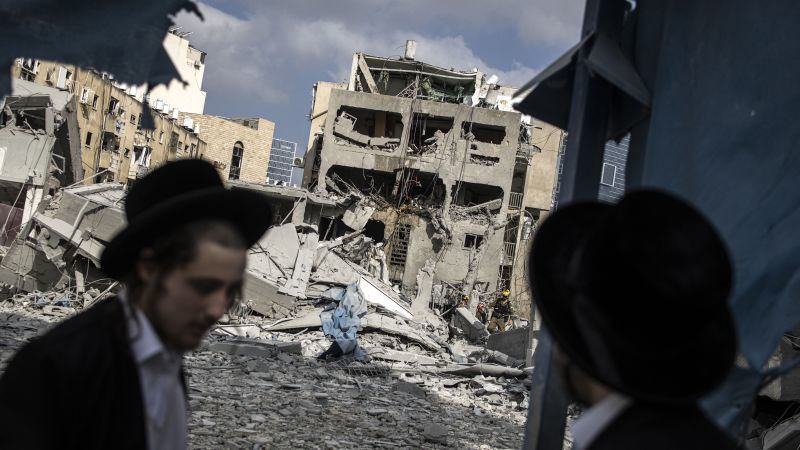Benjamin Netanyahu is once again firmly in control of Israeli politics.
The country’s longest-serving prime minister has pulled himself back from the abyss with what appears to be a wildly successful opening to amilitary campaignagainst Iran.
“Bibi had his Churchill moment,” said one Israeli official from within the coalition, using the prime minister’s nickname.
One day before launching what Israel dubbed Operation Rising Lion, Netanyahu’s government had faced a confidence vote from the opposition.
Two of the ultra-Orthodox parties threatened to vote against the government in what would have put major pressure on Netanyahu. But he survived the vote – with quite some margin.
Twenty-four hours later, Israel began attacking Iran. In one instant, Netanyahu’s political problems were swept away. No more ultra-Orthodox parties complaining about the military draft or far-right parties shouting about praying in the al-Aqsa compound.
“The cards are in his hands. If they weren’t a week ago, they are now,” said the official.
The weekly political protests – first over the judicial reform, then over the war in Gaza – that have dogged Netanyahu for much of his current term quickly vanished, with orders from Israel’s Homefront Command forbidding large gatherings of people. Netanyahu’s testimony in his trial on charges of corruption is on hold and out of the headlines. The stories of the hostages still held in Gaza for more than 600 days of war are no longer front-page news.
Netanyahu is well aware of the political consequences of such a successful military operation, according to an Israeli source in the prime minister’s orbit, though the source insists it’s not his focus right now
“If we are doing something good for Israel, it’s good to us,” the source said. “It’s good for you electorally, it’s good for you with the voters … He will harvest this in the future.”
The source also pointed out the complete reversal of the political opposition from attacking Netanyahu to supporting him.
“This time, we have unity almost all over the Knesset, except from the Arab parties, and we have unity in the people,” said the source.
Iranhas been at the center of Netanyahu’s identity for nearly his entire political career. His time as Israel’s longest-serving leader is replete with warnings about Iran. Some have been borderline cartoonish, like when he held up a drawing of a bomb to warn of Tehran’s advancing nuclear program at the United Nations General Assembly in 2012. He has since returned to the same podium – and many others – to lecture the world repeatedly about the intent of the Ayatollahs.
Israel’s existential fear wasn’t a single one of its adversaries. It was all of them combined: an overwhelming attack from Hamas, Hezbollah, Iran and the Shiite proxies in Syria and Iraq. This was Israel’s nightmare scenario that Hamas tried to instigate with its attack on Israel on October 7, 2023.
It quickly became evident that each entity had its own interests.
Hezbollah began launching attacks against Israel on October 8, but it was far from the massive barrages which worried the military’s leadership. Iran launched two retaliatory attacks against Israel last year in April and October. The Houthis began firing drones and ballistic missiles at Israel from Yemen, but never more than one or two at a time.
Over 20 months of war, Israel was able to defang each of its adversaries.Hamasis a shell of its former self,Hezbollahhas been shattered, and the Houthis don’t have the arsenal to pose a major threat.
“They’ve kind of broken down the axis into the more manageable parts,” former US Ambassador to Israel Dan Shapiro told CNN.
That allowed Israel to turn its focus to Iran without fear of massive retaliation from another front. From Netanyahu’s political perspective, the risk was far lower, especially since Israel’s spy agency has treated Iran like itsplaygroundfor years.
“At his age, he has much less of a political career left to lose,” Shapiro said. “So it’s easier to throw the caution that held him back in the past to the wind, especially to reach for a career-defining goal.”
But whether the military campaign against Iran buoys Netanyahu’s long-sinking polling numbers is not a foregone conclusion, according to Yohanan Plesner, president of the Israeli Democracy Institute.
Polling in recent months has repeatedly shown Netanyahu far behind political rival Naftali Bennett. Crucially, it has indicated he would fall far short of being able to build a coalition with his current political partners, ousting him from leadership.
The Iran operation may not ultimately deliver the political salvation Netanyahu wants, Plesner said, because it is an issue with broad agreement from the left and the right.
“It’s a tremendous consensus around the need for Israel to do the utmost to prevent Iran from becoming nuclear,” Plesner told CNN. “It’s not an issue that there was an ideological debate about.”
Israel is also mired in the ongoing war inGazawith no clear exit and lacking a comprehensive day-after plan. A second war, even with far more tangible accomplishments, presents another risk to Netanyahu if it drags on.
“The ability of the government to translate the military successes into an advantageous diplomatic outcome is yet to be determined,” said Plesner.
